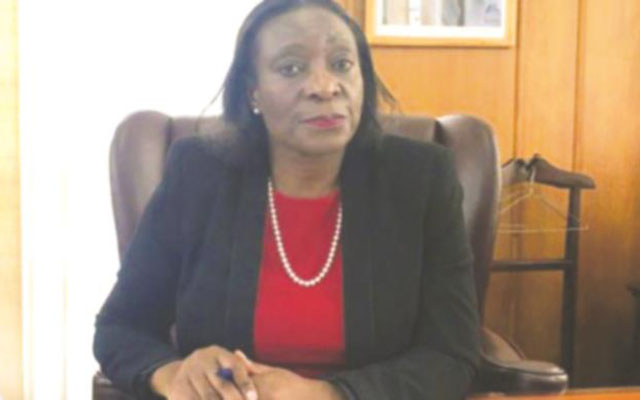Makarau will need to be an Iron Lady

MY TURN WITH TICHAONA ZINDOGA
Walk in her shoes!
Not many people would like to be in the position of Justice Rita Makarau, the chairwoman of the Zimbabwe Electoral Commission.
Elections are beckoning for the Southern African country and 2018, the year for another round of elections after 2013, is just a matter of months.
The exercise and administration of elections in Zimbabwe have been contentious affairs since 2000, at least in recent memory, when the opposition MDC-T came into the picture posting strong showing that has unsettled the ruling party Zanu-PF, in control since independence from colonial rule in 1980.
Unsettled, not dislodged, that is, with the closest latter happening in the elections of 2008 when MDC narrowly beat Zanu-PF but had numbers short of the thresholds stipulated by law.
The year 2008 was the most contentious since 2000 – and in the post-independence history of elections in Zimbabwe. Which is why the Presidential vote had to be taken to a run-off – on top of the grotesque situation of a hung Parliament.
The so-called international community, a euphemism for Britain and the United States, has been refusing to recognise the outcomes of the past elections.
For obvious reasons. The processes have not yielded the desired outcome – that of an opposition victory to dislodge Zanu-PF.
Zanu-PF and President Mugabe angered the West when they decided to embark on the land reform programme and instituted other black empowerment policies and programmes that had the effect of upending property and wealth ownership patterns that derived from colonial relations.
The West openly backs the opposition – to this day.
They call it supporting democracy. It is does not seem to be democracy, though, when the opposition led by Morgan Tsvangirai loses in elections.
There has to be something wrong. One thing is clear: the analysis and acceptance or rejection of results of elections by various stakeholders carries a lot of political baggage.
After all, elections will, quite classically, determine “Who gets what, when, and how”.
How the elections are administered therefore carries a lot of significance.
If the polls are carried out shambolically and in an environment of chaos, violence and intimidation, it is easy to discredit the whole process.
There are fundamental elements of this process:
- Voter registration
- Constituency delineation
- Logistics and resourcing of personnel and voting centres
- Conduct of elections
- Collation and announcement of election results
- Handling of complaints
This is a huge exercise and a costly one, too.
The last elections in 2013 cost some tidy $132 million.
The woman at the centre of it all is the one Rita Makarau.
She has a lot of work on her hands.
Actually, she is neck deep and she has to face not only the logistical and technical nightmares but also political pressures that come with the job.
She is in the news pretty much these days.
But that is to run ahead of ourselves.
Makarau was appointed to lead ZEC in 2013, taking over from the late Simpson Mutambanengwe who resigned on personal health grounds.
She flew into a storm. The country was facing crucial elections and the administration of the same lay with her.
She was accused of being a Zanu-PF agent, and other things; you know, when people talk about “the system” with a lot of suspicion. However, Makarau received key support from Tsvangirai who was the unofficial spokesman of the “principals” to the inclusive Government, comprising also President Mugabe and Deputy Prime Minister Arthur Mutambara.
The principals held their routine Monday meetings, complete with tea and biscuits, and after such a meeting Tsvangirai defended the choice of Makarau.
After all, ZEC was a political animal, made up of commissioners chosen from lists submitted by the three parties in Government and Makarau’s appointment had been agreed to by the three parties.
The elections came and went. Luckily for Makarau, she was not the subject of the accusations and excuses that flew regarding the loss of the opposition.
The opposition chose to blame an Israeli company called Nikuv which we were told was at the centre of a mysterious type of ballot paper that ensured that the opposition lost its votes.
Post-July 31, 2013 Nikuv dominated the narrative of electoral fraud that allegedly cost the opposition.
Only it has never been substantiated so much so that we can call it an urban legend.
It can also be a figure of speech as well, as in how a hwindi at a bus station can complain of how he would have been “Nikuved” out of money solicited from a driver of a kombi.
It is that funny. But it also tells a lot about how elections in Zimbabwe can be subject to certain narratives.
Which makes the job of Makarau difficult. The current issue is around the BVR system. The system involves the capturing of a person’s unique features such as fingerprints which are then stored in a computerised system and made use of in identifying voters and avoid fraud.
It so happened that a Chinese company won the tender to supply the BVR kits, and the opposition began protesting loudly, predicting fraud based on the vexatious idea that the Chinese government has close ties to Zanu-PF.
Interestingly, it took Tsvangirai again, a couple of weeks back, to defend the choice of the Chinese company, somehow salving Makarau’s skin.
“I want to tell you, BVR will not be manipulated,” he said. “These Chinese were chosen by the United Nations and have done work in other countries. Do not be scared or doubt them just because they are Chinese.”
This forced a volte face on the party that had vilified the Chinese company and had begun to weave the next excuse for the next loss, something that drew the dismay of such people as Alex Magaisa, Tsvangirai’s former advisor.
The party spokesman ate the humble pie thus: “Our president is our chief party spokesperson and whatever he has said supersedes all other statements we have issued on any issue.”
He added: “We have learnt from past experiences and have experts on the ground to make sure that the BVR process is not manipulated. We will try everything humanly possible to guard against that. I wish I was a prophet, but 2013 is not 2017.”
Makarau will have to face this kind of bogeymen contrived by the opposition.
She has had a lot of explaining to do in the past few weeks. The MDC-T youth assembly has been threatening demonstrations over BVR and distribution of registration centres.
But yesterday, NewsDay quoted Makarau as shooting back: “We will not stay in the way of their demonstrations. It’s their democratic right to demonstrate.”
She explained: “We have reached out to them (opposition parties). We had a meeting with political parties late last week, where we gave them this information and during that meeting, we made it clear that we were open to receive their representation on how we can improve on the distribution plan that we have come up with.
“We did indicate to them that we were trying to be very scientific in our approach. We are trying to be fair in our approach, but if they can find a way of improving on those objectives and scientific criteria, we are welcome to receive those. They can still demonstrate while they are talking to us, we welcome both.”
She was not done. “If they think they can get answers in the street, they are free to do so,” she said.
It is stuff of an Iron Lady, which Makarau will need to be.











Comments